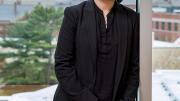Sabrineh Ardalan’s earliest memories, growing up in Washington, D.C., include writing and distributing pro-democracy newsletters with her family. Her Iranian parents had sought asylum in the United States in the early 1980s, after the Iranian Revolution. At the dinner table, politics and world events were constant topics: “I always knew I wanted to do human-rights work.” She chose law school in order to be “an advocate on the ground,” and is now a clinical professor of law who directs Harvard’s Immigration and Refugee Clinical Program—the same program where she worked as a student, before earning her J.D. in 2002. Then, Ardalan’s principal client was a Ugandan man fleeing political persecution, who was eventually granted asylum. In the years since 2008 (when she returned to the clinic as a teaching fellow), she’s represented asylum-seekers whose journeys reflect world crises, from east Africa, Syria, and Afghanistan, to Central America. Her “pandemic hobby” is visiting goat farms and taking nature walks with her three-year-old, “just to not think about the world for a bit.” But in March, as the war in Ukraine unfolded, Ardalan was watching carefully, weighing how to help (the Harvard Representation Initiative, a part of the clinical program that provides immigration-related legal services to University community members, had already begun supporting those affected). “It’s heartwarming to see the public support for Ukrainian refugees,” she said, “and at the same time, I continue to be concerned about refugees from other countries being turned away.” Recent years have seen increasing interest in the clinic’s work—especially during the Trump administration, she says, whose policies prompted an “outpouring” of students eager to work on immigration issues. Those years felt like “a mad dash,” she says, “but I think what I’m realizing now is, it’s really a marathon.”
"On the Ground" With Asylum-Seekers
"On the Ground" With Asylum-Seekers
Sabrineh Ardalan directs Harvard’s Immigration and Refugee Clinic.

Sabrineh Ardalan
Photograph by Jessica Scranton
You might also like
How a Harvard Hockey Legend Became a Needlepoint Artist
Joe Bertagna’s retirement project recreates figures from Boston sports history.
Introductions: Mallika Monteiro
A conversation with a beer industry executive
Mount Vernon, Historic Preservation, and American Politics
Anne Neal Petri promotes George Washington and historic literacy.
Most popular
Explore More From Current Issue

At Harvard’s Beck-Warren House, Ghosts Speak Many Languages
The quirky 1833 home now hosts Celtic scholars.

A New Landscape Emerges in Allston
The innovative greenery at Harvard’s Science and Engineering Complex

How a Harvard and Lesley Group Broke Choir Singing Wide Open
Cambridge Common Voices draws on principles of universal design.





